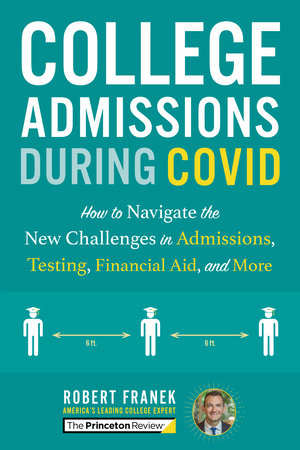Ways the College Admissions Process Has Changed (and Stayed the Same!) During the Pandemic
by Robert Franek
It may well feel like everything has changed when it comes to college admissions during COVID-19. As understandable as that belief is, the fact is that the core of the process has stayed the same. In Summer 2020, 360 admissions leaders issued a collective statement titled “Care Counts in Crisis: College Admissions Deans Respond to COVID-19.” The primary goal of the statement was to underscore their commitment to admissions equity and to encourage self-care, balance, meaningful learning, and care for others. In other words, the college admissions process is, at its core, a human process. It’s a good thing to remember in these tough and changing times.
Though much has stayed the same, some things have changed. Here is some direct guidance on how the college admissions process has changed.
1) High School GPA
A student’s high school GPA is still the most important factor in college admission decisions. However, as you’re aware, a huge shift to remote learning happened in spring 2020. As most schools moved from full-time in-person classes to full-time remote learning, student outcomes changed, too. Many high schools adopted pass/fail grading to ensure fairness for students, which is a great thing! However, only letter-grade classes count toward GPA, so students will need to make sure that all future letter-grade classes reflect their best possible performance. If your teen has fewer letter-grade classes, the ones they do have will count more. All that said, colleges know that there’s a global pandemic going on. If your teen is taking letter-grade classes and their grades slide a bit right now, colleges will understand why and they’ll take that into account.
2) Standardized Tests
SAT and ACT scores take the lead, but admissions officers consider students’ performance on other standardized tests as well. (Hello, AP exams!) Remember that the SAT and ACT are important not just for admission but also, in many cases, for merit-based aid. Also remember that a growing number of colleges are going “test-optional” and have removed testing requirements for applicants, either temporarily or as a permanent measure to shift the focus of the application to the student’s overall high school experience. Still, if your teen can take the SAT and ACT, they should. Going test-optional doesn’t mean that a college won’t look at scores, just that it doesn’t require them. Given that there are lots of ways students aren’t able to distinguish themselves right now (if they can’t participate in extracarriculars like sports, theater, or music, for example, because of school closures), standardized tests can provide a chance to shine.
3) Extracurricular Activities
Colleges will have to recalibrate how they evaluate applicants’ extracurricular activities, understanding that opportunities have changed. After all, teens may not be meeting up with their Model United Nations team right now, competing in Math League competitions, or participating in music or theater productions, athletics, etc. For students whose schools have cancelled extracurriculars, whose clubs or sports teams are on hiatus, or who have new family responsibilities barring them from taking part, take heart. Schools won’t penalize you for not availing yourself of an opportunity that doesn’t exist!
4) College Essays
This is one area of an application over which students have full control, no matter what else is going on. College essays are more important than ever! Take extra care to ensure your teens make an outline, write, edit, and then edit some more. Have them think about what makes them, them. They may opt to write about how COVID-19 is affecting them, but be sure they keep in mind that a lot of other students are likely to choose that topic, as well. Make sure that whatever they write about reveals something about who they are and what they value.
5) College Interviews
Many colleges encourage students to interview with an admissions representative or alumnus as part of the college application process. That happens during any year. That said, the same offer in this new admissions environment is a golden opportunity! It’s another chance to show off the unique personality that students will bring to college and to build a personal relationship with gatekeepers.
6) Recommendation Letters
Recommendation letters haven’t changed a bit. Teachers can still help students stand out by singing their praises and helping to develop the picture of who they are as a person.
7) Demonstrated Interest
Finally, colleges consider students’ demonstrated interest — all the things they’ve done to show that they’re a good fit for their school and that they’d be likely to attend if they were accepted. Your teens may not be able to visit in person, but they can take an online tour. They can comb through the school website. They can talk to or email with current students. Propsective students should convey their sincere interest in their application and in any communication they have with members of the admissions team. Schools are dealing with a lot of uncertainty, too, so students are likely to have an advantage in the process if the schools know that teens are as keen on the schols as the schools are on them.
The bottom line is that lots of colleges — especially those that tend to draw students from across the country and the world — are dealing with tremendous uncertainty, just like teens and their parents. Universities and colleges are making Herculean efforts to be fair and not penalize students for circumstances beyond their control. Students should keep up with their studies, stay sharp with their skills, and remain optimistic for the future.
-
By the Author:

